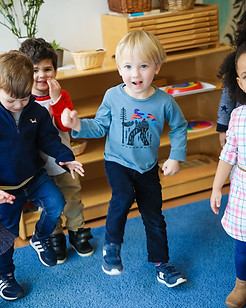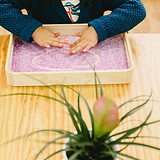academics
why your preschool choice matters: foundational skills build early on
Research has proven that 85% of child's brain is formed by the age of 3. From the day of their birth, children are actively engaged in absorbing everything they can from everything around them. Even very young children have the capacity to absorb astonishing amounts of information and to develop extraordinary skills. Montessori education nurtures this innate drive to learn into the child’s school years. Every part of every program -- whether it is the construction of the classroom, the materials presented, the form in which they are presented, or the choices children are given -- is a product of Montessori’s observation of children and a desire to produce a learning context consistent with their needs.
montessori is child-centric
At HMS in an authentic Montessori approach, we provide your child precisely the environment and tools they need most at each stage of their development. This attention and specialization produces children who are centered, self-confident, well-balanced and focused. Children are directed while also having free choice.
high-level brain function
The Montessori environment is designed to foster a high level of the cognitive, sensory, motor and social development reflected in each stage of child development. It invites children to engage in independent learning activities of their own choosing, to make their own discoveries about how the world around them works and to cultivate concentration, motivation, and self-discipline -- all qualities that are hallmarks of what we now call executive brain function.

“Never help a child with a task at which he feels he can succeed.” Dr. Montessori
fostering independence & confidence
Often, adults do too much for children, and unintentionally undermine their confidence in their own abilities. In an authentic Montessori program, we take the opposite approach. Our toddlers set their own table for snack time, they serve themselves, they clean up, put on their own coats. Tantrums often happen in the conflict between a child who wants to do it “all by myself” and an adult who just wants to get it done quickly. We give the child the control to learn the skills to instill the pride and confidence of completing tasks.
Teachers in Montessori classrooms are guides and facilitators, not instructors. Montessori teachers wander among a classroom of children who, although unaware of it, are actively engaged in self-directed learning. Lessons are taught individually or in small groups. Children are allowed to follow their interests and proceed at their own pace; it is the teacher’s job to notice when the child is ready for more and to introduce the next steps to the child at that time. Children are able to take ownership for their learning and skill development, to become excited with every further piece of knowledge and know-how.
charting your child's development
Feel free to explore HMS' programs and carefully structured learning phases that are tailored to be age-appropriate to what your child needs developmentally.
the curriculum
The key research and findings around a child’s development in their early childhood guides the areas of study in The Montessori classroom. The preschool curriculum introduces the child to writing, reading, arithmetic, science, geography and other academic skills. It helps develop auditory, visual and other sensory discrimination. It assists the child to develop practical life skills, encouraging the child to become independent.
practical life
Children learn daily-life skills, such as how to get dressed, prepare snacks, set the table, and care for plants and animals. They also learn appropriate social interactions, such as saying please and thank-you, being kind and helpful, listening without interrupting, and resolving conflicts peacefully. In addition to teaching specific skills, Practical Life activities promote independence, and fine- and gross-motor coordination.
sensorial
Children refine skills in perceiving the world through their different senses, and learn how to describe and name their experiences—for example, rough and smooth, perceived through touch. Sensorial learning helps children classify their surroundings and create order. It lays the foundation for learning by developing the ability to classify, sort, and discriminate—skills necessary in math, geometry, and language.
math
Through hands-on activities, children learn to identify numerals and match them to their quantity, understand place-value and the base-10 system, and practice addition, subtraction, multiplication, and division. They also explore patterns in the numbering system. With an exploratory approach, children do more than just memorize math facts; they gain a firm understanding of the meaning behind them.
language
Activities throughout the Early Childhood classroom teach language, help children acquire vocabulary, and develop skills needed for writing and reading. The ability to write, a precursor to reading, is taught first. Using hands-on materials, children learn letter sounds, how to combine sounds to make words, how to build sentences, and how to use a pencil. Once these skills are acquired, children spontaneously learn to read.
cultural studies
A wide range of subjects, including history, geography, science, art, and music, are integrated in lessons in the cultural area of the curriculum. Children learn about their own community and the world around them. Discovering similarities and differences among people and places helps them develop an understanding and appreciation of the diversity of our world, and a respect for all living things.








